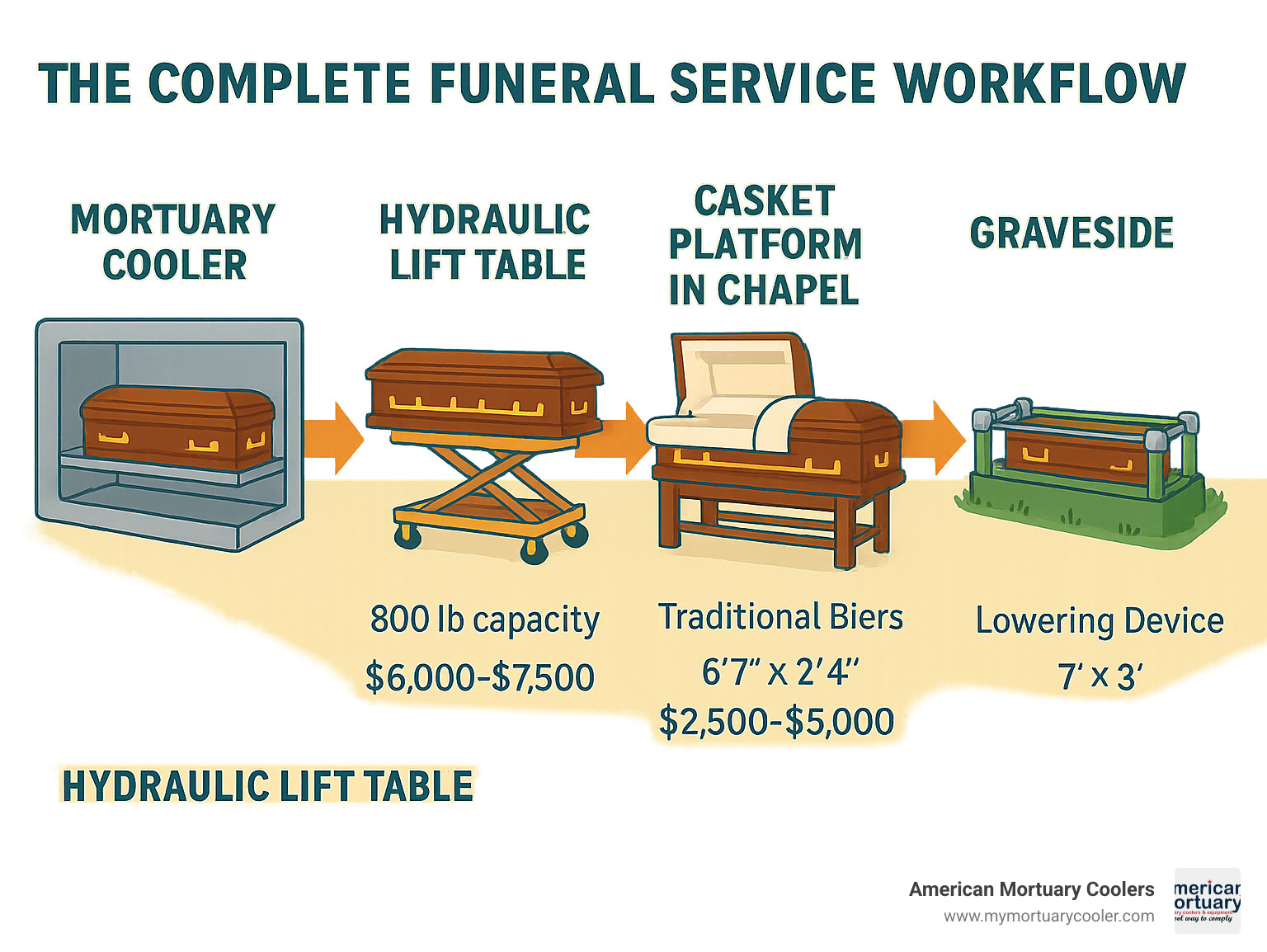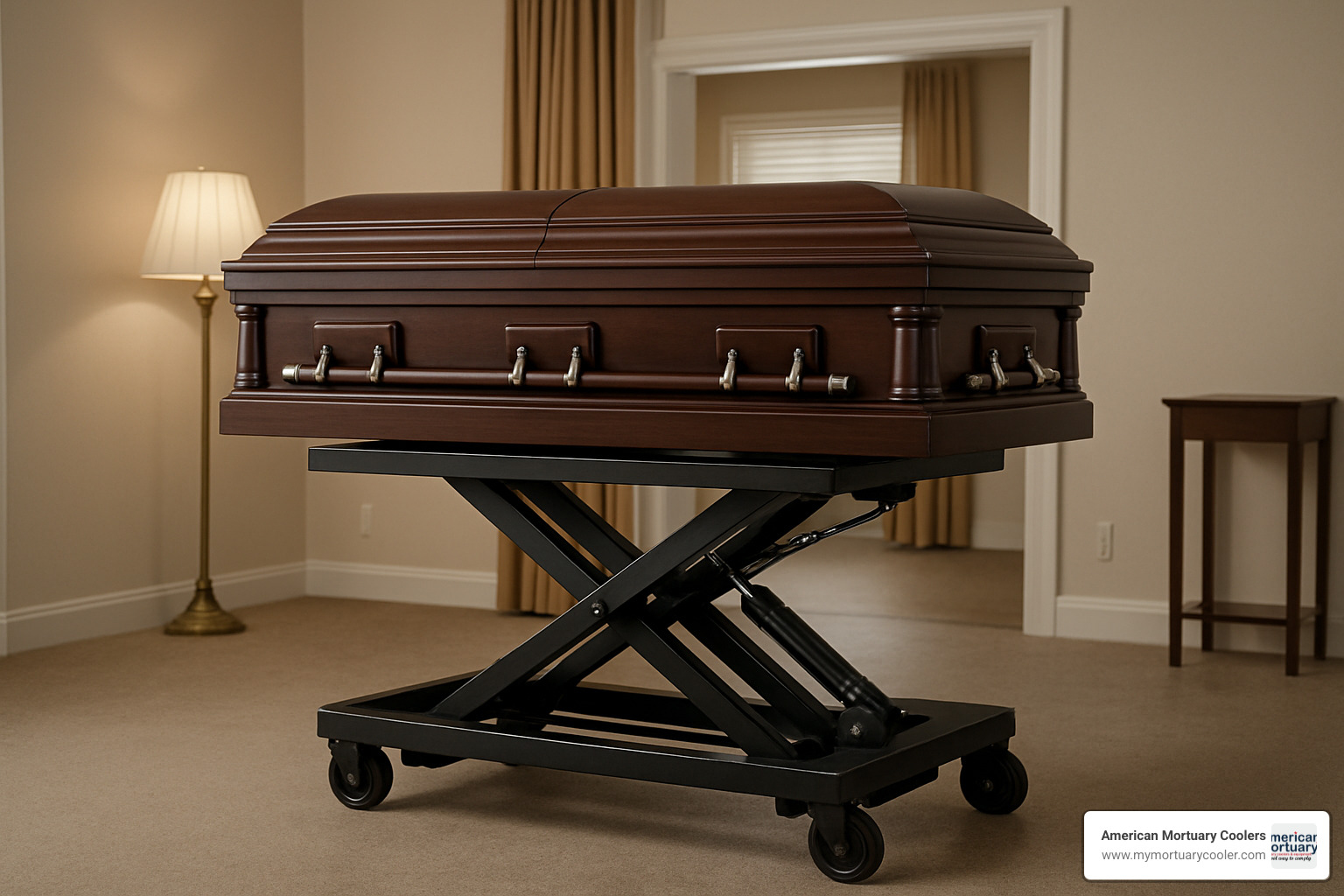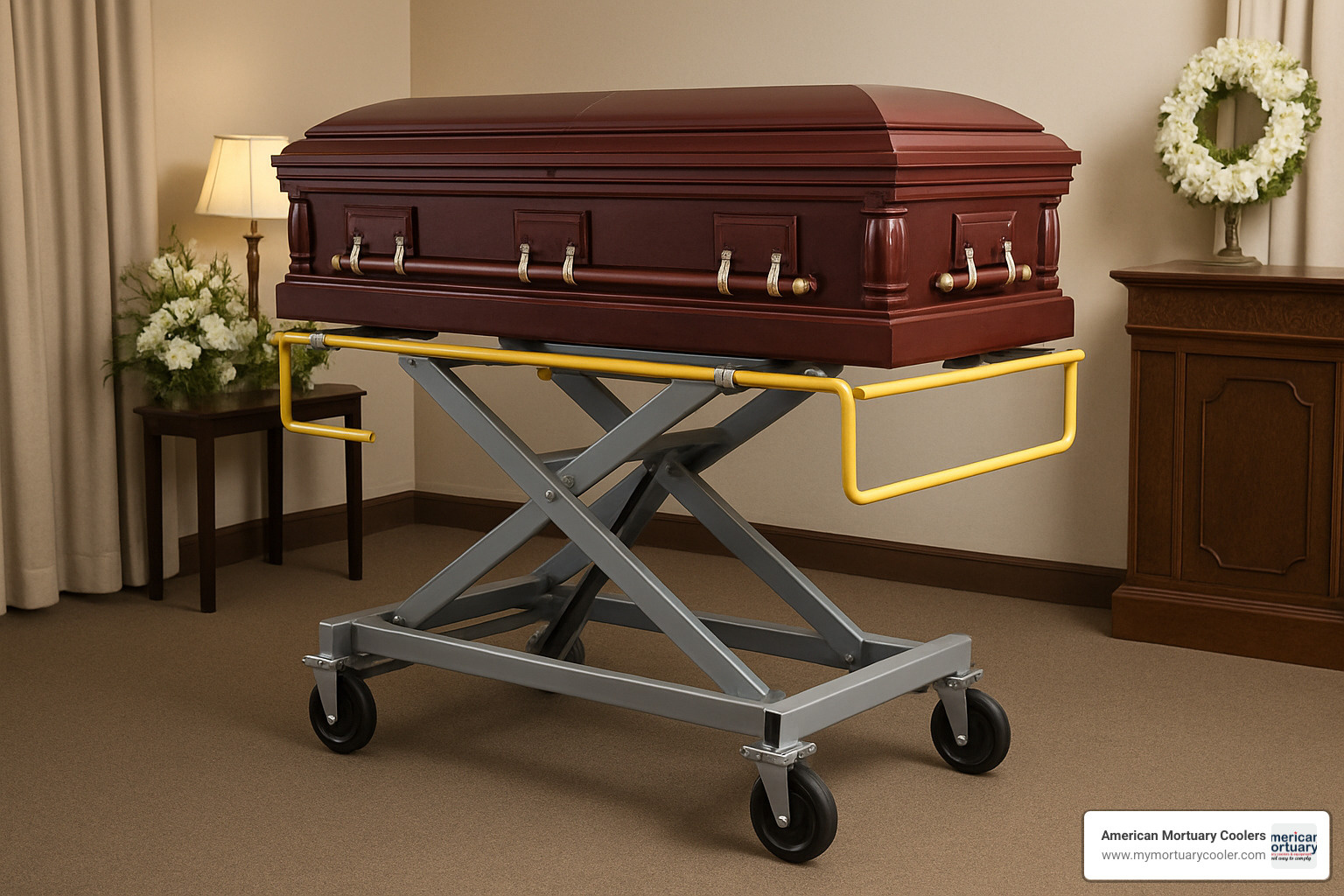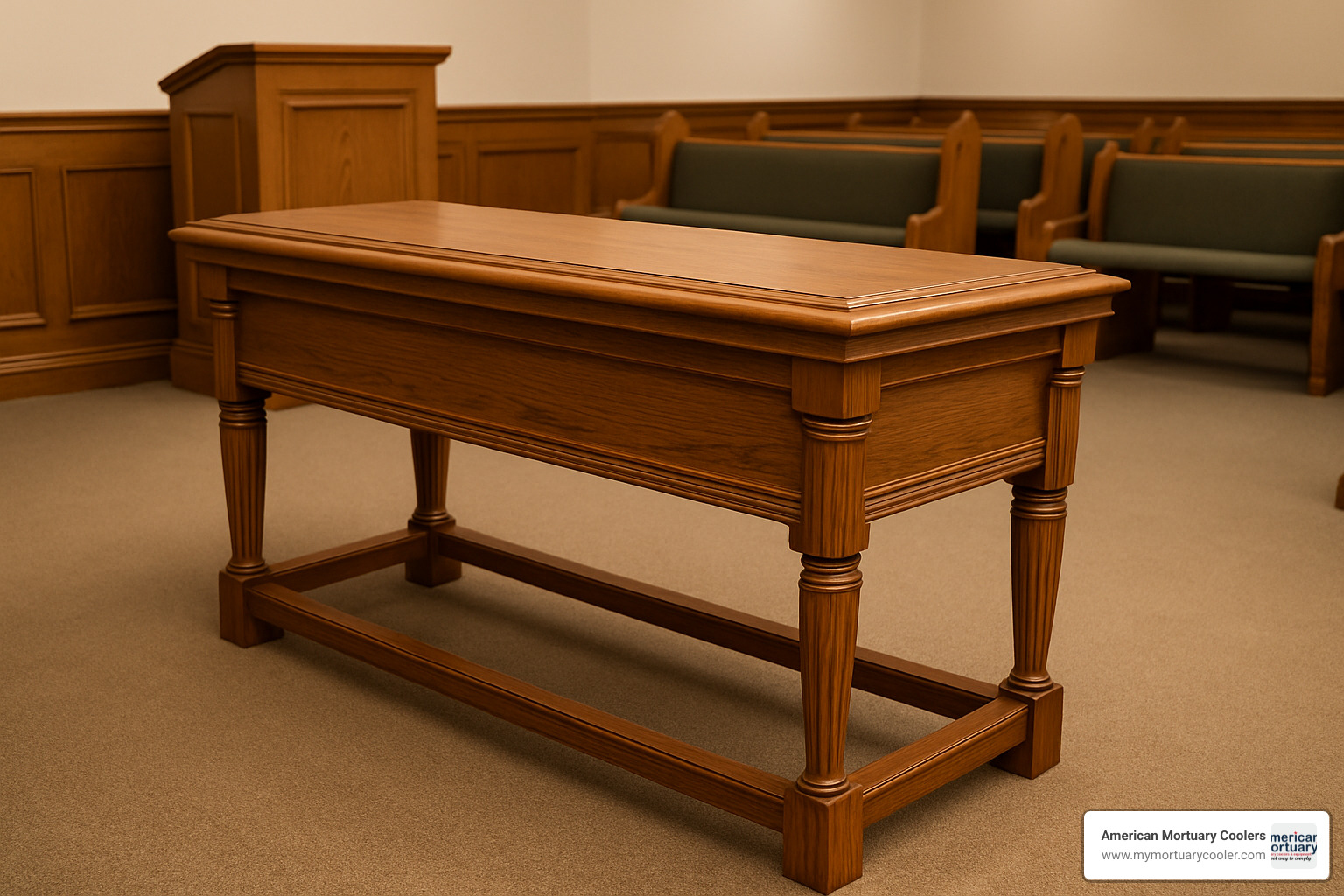Why Platforms for Caskets Are Essential for Every Funeral Service
Platforms for caskets serve as the foundation for dignified funeral presentations, providing stable support and proper elevation for viewing ceremonies. Whether you're displaying a casket in your chapel or moving it between service areas, the right platform ensures both safety and reverence.
Quick Answer - Main Types of Platforms for Caskets:
- Traditional Biers - Wooden display stands with casters ($2,275-$4,990)
- Hydraulic Lift Tables - Battery-powered platforms with 1,200 lb capacity ($6,449-$7,390)
- Historic Catafalques - Ceremonial platforms like the Lincoln catafalque (7'1" × 2'6")
- Roller Stands - Transfer aids like the Casket Buddy (supports up to 1,000 lbs)
- Church Trucks - Mobile platforms for processions and transport
The funeral industry has relied on these platforms since 1865, when the first Lincoln catafalque was constructed from "rough pine boards covered with black cloth." Today's platforms combine traditional dignity with modern safety features like heavy-duty casters, rubber bumpers, and hydraulic lifts that protect both your staff and the families you serve.
Nothing feels worse than overpaying at your time of need - but the same principle applies to funeral directors investing in equipment. The wrong platform choice can lead to safety issues, workflow problems, and unnecessary expenses that impact your bottom line.
Modern platforms address three critical needs: safe casket handling (preventing workplace injuries), dignified presentation (creating proper viewing height and stability), and operational efficiency (enabling smooth transfers between preparation areas, chapels, and transport vehicles).
As American Mortuary Coolers, a national-level mortuary equipment supplier, we've helped funeral homes nationwide select the right platforms for caskets that match their specific operational needs and chapel aesthetics. Our experience with mortuary equipment has shown that the right platform choice significantly impacts both staff safety and service quality.

Platforms for caskets terms you need:
Understanding Platforms for Caskets: Definition & Purpose
When we talk about platforms for caskets, we're really talking about the unsung heroes of funeral service operations. These aren't just fancy tables – they're carefully engineered support systems that make the difference between a smooth, dignified service and a stressful situation where something could go wrong.
Think of these platforms as the foundation of every funeral ceremony. They include everything from traditional biers (those neat wooden stands you see in chapels) to modern hydraulic lift tables that can raise and lower caskets with the push of a button. You'll also find historic catafalques like the famous Lincoln platform, roller stands for easy transfers, and specialized equipment that helps move caskets safely from place to place.
What Is a Casket Platform?
A casket platform is essentially a specialized display stage that becomes the focal point of any funeral ceremony. But here's what makes them different from regular furniture – they're built to handle serious weight (we're talking up to 1,200 pounds) while still looking dignified and appropriate for such an important occasion.
From a practical standpoint, these platforms solve a real safety problem. OSHA safety standards exist for good reason – lifting and moving heavy caskets has caused too many back injuries and workplace accidents over the years. Nobody wants their staff getting hurt, and families certainly don't want to witness an accident during their time of grief.
Modern platforms address this by incorporating smart safety features. You'll find hydraulic lifts that do the heavy lifting for you, non-marking casters that won't damage your floors, and ergonomic height adjustments that let your staff work comfortably without straining their backs.
Primary Functions of Platforms for Caskets
Every platform for caskets needs to excel at three essential jobs, and understanding these helps you choose the right equipment for your funeral home.
Stabilization is probably the most critical function. Nothing can go wrong during a service – period. Traditional biers use rubber bumpers on top to keep caskets perfectly still and protect those expensive finishes from scratches. Modern lift tables go even further with casket locks and roller platforms that prevent any shifting during transport.
Height adjustment might seem simple, but it's incredibly important for creating the right atmosphere. Lift tables can adjust from a low 20-inch loading height all the way up to 65 inches for optimal viewing. This flexibility lets you accommodate different chapel layouts, family preferences, and accessibility needs without breaking a sweat.
Procession mobility is where good equipment really shines. Heavy-duty, non-marking casters let you reposition caskets effortlessly during services, while specialized transfer aids like the Casket Buddy make loading and unloading between hearses, church trucks, and display biers feel almost effortless.
Main Types of Platforms for Caskets

Choosing the right casket platform feels a bit like selecting the perfect foundation for your home - it needs to be strong, reliable, and match your specific needs. The funeral industry offers several distinct types of platforms for caskets, each designed with different operational requirements in mind.
Whether you're running a small family funeral home or managing a high-volume operation with multiple floors, understanding these platform options helps you make smart equipment decisions. From time-tested wooden biers to cutting-edge hydraulic systems, each type brings its own advantages to your daily operations. More info about showroom options can help you understand how these platforms work within your overall display strategy.
Traditional Biers & Church Trucks
Traditional casket biers remain the backbone of most funeral home operations, and for good reason. These solid wood frames - typically crafted from beautiful hardwoods like oak or mahogany - combine classic elegance with practical functionality.
What makes these platforms so popular? They feature heavy-duty, non-marking casters that glide silently across chapel floors, plus rubber bumpers that keep caskets stable while protecting those precious finishes from scratches or dings. It's the kind of thoughtful design that prevents those heart-stopping moments when something shifts unexpectedly during a service.
The investment for quality casket biers ranges from $2,275 to $4,990, depending on the craftsmanship and features you choose. Higher-end models offer custom stain matching, so your new bier blends seamlessly with your existing chapel furniture. Basic models focus on essential functionality without breaking the budget - perfect for funeral homes just starting out or expanding their equipment.
Church trucks serve a similar purpose but shine when it comes to processional use and transport between locations. These mobile platforms prioritize smooth maneuverability and often feature lower profiles that make loading from hearses much easier on your staff's backs.
Historic Catafalques (e.g., Lincoln)
The Lincoln catafalque tells a fascinating story about casket platform design that's remained virtually unchanged since 1865. This historic platform, originally built from pine boards covered with black cloth, supported President Abraham Lincoln's casket during his lying in state - and it's still in use today.
The dimensions speak to timeless functionality: 7 feet 1 inch long, 2 feet 6 inches wide, and 2 feet high, with a base extending to 8 feet 10 inches by 4 feet 3½ inches. These measurements weren't arbitrary - they represent the ideal proportions for dignified casket display that funeral directors still rely on today.
What's remarkable about the Lincoln catafalque is how it demonstrates that effective platform design doesn't require complex technology. Sometimes the best solutions are the simplest ones. This platform continues serving for ceremonial heritage events and national funerals, proving that quality materials and thoughtful construction create equipment that lasts for generations.
Modern Hydraulic Lift Tables & VRC Lifts
Modern hydraulic lift tables represent the technological leap that's revolutionized casket handling in funeral homes everywhere. These platforms run on 12V DC battery systems and pack serious lifting power - we're talking 1,200-pound capacity with height ranges from 20 inches to 65 inches.

The real game-changer here is the safety interlocks and ergonomic design. These platforms include automatic chargers with cutoff protection, roller platforms with casket locks, and caster steering with reliable brake systems. The standard 28-inch width by 70-inch length platform handles all standard casket sizes, with optional upgrades like platform extensions and integrated scales.
VRC lifts (Vertical Reciprocating Conveyor lifts) take this concept even further for multi-story funeral homes. These systems can travel up to 36 feet vertically while maintaining that crucial 750-1,200 pound capacity. They include permanent enclosures at both levels, with options for fire-rated doors and automatic mechanisms that make vertical casket transport safe and dignified.
For funeral homes dealing with multiple floors, these hydraulic systems eliminate the physical strain and safety risks of manual handling. Your staff's backs will thank you, and families receive more professional service when everything moves smoothly and safely.
Trolleys, Roller Stands & Transfer Aids
Sometimes the most valuable equipment solves those everyday challenges that others overlook. The Casket Buddy exemplifies this perfectly - it's a specialized transfer device that handles the tricky job of moving caskets between different height surfaces.
With its 1,000-pound rating and adjustable height from 22 to 31 inches, this roller stand bridges those awkward gaps between transport vehicles and display platforms. The 31-inch clearance between legs accommodates most carts and biers, while the tilting roller platform slides smoothly under caskets for effortless transfers.
Mortuary trolleys and other transfer aids focus on behind-the-scenes functionality rather than public display. Many feature marine-grade aluminum construction for corrosion resistance and reduced weight - practical benefits that matter during busy days when you're moving multiple caskets.
These transfer aids address a specific operational reality: the seamless coach-to-bier transfer that happens multiple times daily in active funeral homes. When equipment works smoothly, your entire operation flows better, and families experience the professionalism they deserve during difficult times.
Key Specifications: Materials, Dimensions, Codes & Sustainability
When you're investing in platforms for caskets, understanding the technical specifications can save you thousands of dollars and years of headaches. The materials, dimensions, and regulatory requirements vary dramatically between different platform types, and making the wrong choice often means expensive replacements down the road.
Modern casket platforms span a surprising range of construction materials, from traditional hardwoods that have served funeral homes for decades to cutting-edge marine-grade aluminum that resists corrosion in humid climates. Steel tubing provides the backbone for hydraulic lift systems, while powder coating ensures these platforms maintain their professional appearance despite daily use and frequent cleaning.
The funeral industry has begun embracing biodegradable options and sustainable materials, particularly as families increasingly request environmentally conscious services. Organizations like the Green Burial Council have established standards that influence platform selection, especially for funeral homes serving eco-minded communities.

Common Construction Materials & Finishes
Oak, cherry, and mahogany remain the gold standard for traditional wooden platforms, offering both the strength to support heavy loads and the dignified appearance families expect. These hardwoods accept custom stains beautifully, allowing you to match existing chapel furniture perfectly.
Mahogany veneer provides an excellent middle ground – you get the rich appearance of solid hardwood without the premium price tag, while maintaining the durability needed for daily operations.
Marine-grade aluminum has revolutionized platform construction, especially for facilities dealing with high humidity or requiring frequent sanitization. This material weighs significantly less than steel alternatives while offering superior corrosion resistance.
The push toward sustainability has introduced FSC-certified timber and recycled steel components as viable options. These materials meet environmental standards without compromising functionality. Eco-cloth draping made from natural fibers provides 100% biodegradable alternatives to synthetic fabrics. Biodegradable Caskets & Green Options offers additional guidance on sustainable funeral practices.
Low-VOC coatings address indoor air quality concerns while maintaining the professional finish required in funeral settings.
Standard Sizes & Weight Capacities
Platform dimensions vary dramatically based on intended use. The historic Lincoln catafalque's 7'1" × 2'6" × 2' dimensions established the baseline for ceremonial platforms, while modern lift tables typically measure 28" × 70" to accommodate standard caskets with adequate operational clearance.
Weight capacities range from 750 pounds for basic display platforms to 1,200 pounds for heavy-duty hydraulic systems. Don't underestimate this specification – oversized caskets and specialized services require platforms capable of handling increased loads safely.
The Casket Buddy's specifications illustrate typical transfer equipment requirements: 1,000-pound capacity with height adjustment from 22" to 31" and 31" clearance between support legs.
Safety, Regulatory & Code Considerations
ANSI B20.1 standards govern vertical reciprocating conveyors used for casket transport, establishing comprehensive safety requirements for enclosures, interlocks, and operational procedures.
The FTC Funeral Rule impacts platform selection indirectly but significantly. Since you must accept customer-supplied caskets, your platforms need compatibility with various casket styles and dimensions from different suppliers.
State licensing requirements may specify minimum equipment standards for funeral homes, including casket handling and display capabilities. Check your state's specific requirements before making platform investments.
ADA compliance considerations affect aisle clearance around platforms and accessibility for family members with mobility limitations.
Selecting, Customizing & Maintaining Your Display Platform

Choosing the right platforms for caskets feels overwhelming at first - there are so many options, and you want to get it right the first time. The good news is that most funeral homes have similar needs, and understanding your specific situation makes the decision much clearer. The Complete Guide to Casket Platform Options walks through the decision-making process step by step.
Think of platform selection like choosing a vehicle for your business. You wouldn't buy a sports car to haul equipment, and you wouldn't buy a dump truck for quick errands around town. The same logic applies to casket platforms - your choice should match your actual needs, not just what looks impressive in a catalog.
How Funeral Homes Choose the Right Platform
Service volume tells you everything you need to know about platform requirements. If you're handling 200+ services annually, your staff will thank you for investing in hydraulic lift tables that eliminate back-breaking manual lifting. Smaller operations with 50-75 services might find traditional biers perfectly adequate - and much easier on the budget.
Multi-level buildings change everything. You simply cannot safely carry caskets up and down stairs, period. Facilities with multiple floors need hydraulic lifts or VRC systems - there's no workaround that doesn't create serious safety and liability issues.
Budget considerations go beyond sticker shock. Yes, hydraulic lift tables cost $6,449 to $7,390 compared to $2,275 to $4,990 for traditional biers. But consider the hidden costs: worker compensation claims from lifting injuries, staff turnover from physically demanding work, and the time lost when someone gets hurt.
Staffing ergonomics matter more than many funeral directors realize. If your team includes older staff members or anyone with previous back injuries, powered equipment isn't a luxury - it's essential. The investment pays for itself through reduced injuries and improved staff retention.
Custom Finishes, Branding & Eco-Friendly Upgrades
Your platform should blend seamlessly with your chapel's aesthetic, not stick out like a sore thumb. Custom stain colors can match existing furniture perfectly, creating a cohesive look that families notice and appreciate. Many funeral homes find that coordinated chapel furniture creates a more professional, polished appearance.
Embroidered drapes offer subtle branding opportunities without being pushy. Your funeral home's name or logo can be tastefully incorporated into the platform's fabric elements. These personal touches help distinguish your facility from competitors while maintaining appropriate dignity.
FSC-certified timber and recycled steel components appeal to environmentally conscious families. These sustainable materials typically cost more upfront, but they align with the growing demand for green funeral options. Some funeral homes find that eco-friendly equipment helps them attract families who prioritize environmental responsibility.
Maintenance, Inspection & Safety Routines
Regular maintenance prevents embarrassing equipment failures during services - and trust me, you don't want a platform to malfunction during a viewing. Caster lubrication should happen monthly to keep wheels rolling smoothly and prevent floor damage from seized wheels.
Hydraulic battery charging runs automatically on modern systems, but you should still check battery levels periodically. The 12V DC systems with automatic chargers are maintenance-free, but "maintenance-free" doesn't mean "ignore completely."
Weight-load logging helps you spot problems before they become emergencies. Keep a simple record of any unusual sounds, movements, or performance issues. Annual professional inspections by qualified technicians ensure safety systems work properly and catch wear components before they fail.
Price Ranges & Financing Options
Let's talk money - because these aren't impulse purchases. Traditional biers run $2,300 to $5,000, while hydraulic lift tables cost $6,400 to $7,400. These represent major capital investments that most funeral homes finance rather than pay cash.
Financing options make expensive equipment more manageable. Traditional equipment loans, lease-to-own arrangements, and manufacturer financing programs spread costs over time. Some suppliers offer 3-payment plans that help smaller funeral homes access quality equipment without depleting cash reserves.
Leasing arrangements work well for funeral homes that prefer upgrading equipment regularly or those with limited capital. The downside is higher total costs over time - leasing typically costs more than direct purchase in the long run.
At American Mortuary Coolers, we've helped funeral homes across the contiguous 48 states select platforms that match their specific needs and budgets. Our experience shows that the right platform choice significantly impacts both daily operations and long-term satisfaction.
Frequently Asked Questions about Platforms for Caskets
What makes hydraulic lift tables safer than manual handling?
Hydraulic lift tables transform funeral home safety by eliminating the dangerous manual lifting that has injured countless funeral directors over the years. Think about it - caskets can weigh up to 1,200 pounds when occupied, and trying to lift or reposition them manually puts enormous strain on your back and shoulders.
These powered platforms adjust from 20 to 65 inches in height with the push of a button, letting your staff position caskets at comfortable working levels without any heavy lifting. The 12V DC battery systems provide reliable power when you need it most, while safety interlocks prevent the platform from operating when access doors are open - protecting both your staff and the families you serve.
The ergonomic benefits go beyond preventing injuries. Your staff will feel less fatigued at the end of long service days, and you'll likely see fewer workers' compensation claims. Many funeral directors tell us these platforms pay for themselves through reduced injury costs alone.
Can I match a platform's finish to my existing chapel decor?
Absolutely! Most platforms for caskets can be customized to blend seamlessly with your chapel's aesthetic. Traditional wooden biers offer custom stain matching services that coordinate perfectly with your existing furniture - whether you have rich mahogany pews or lighter oak finishes.
You're not limited to just wood tones either. Many manufacturers provide custom embroidered drapes that can incorporate your funeral home's colors or logo, creating a cohesive professional appearance that families notice and appreciate. Personalized nameplates add another touch of distinction that sets your facility apart.
The key is working with suppliers who understand that your chapel isn't just functional space - it's where families create lasting memories. A well-coordinated platform becomes part of the dignified atmosphere you've worked so hard to create.
Are there regulations on using platforms during public services?
While there aren't specific federal regulations governing casket platform use during services, several important standards do apply to your operations. ADA compliance affects how much aisle clearance you maintain around platforms, ensuring families with mobility challenges can participate fully in services.
State licensing requirements may specify minimum equipment standards for funeral homes, including safe casket handling capabilities. These vary by location, so check with your state board to ensure compliance.
OSHA workplace safety regulations influence platform selection more directly, particularly regarding manual lifting limitations and ergonomic considerations for your staff. These standards protect your employees and can affect your insurance rates and liability exposure.
The bottom line? Choose platforms that meet professional safety standards while serving your families with dignity. When in doubt, consult with equipment suppliers who understand both the regulatory landscape and the funeral industry's unique needs.
Conclusion
Choosing the right platforms for caskets isn't just about buying equipment – it's about investing in your funeral home's future success. The decision affects everything from your staff's daily comfort to the lasting impression families carry from their most difficult moments.
We've seen how funeral platforms evolved from President Lincoln's simple pine catafalque in 1865 to today's sophisticated hydraulic systems. That journey tells us something important: while technology advances, the core mission remains unchanged – providing dignity, safety, and support when it matters most.
The numbers speak clearly about your investment options. Traditional wooden biers ranging from $2,275 to $4,990 offer time-tested reliability with beautiful craftsmanship. Modern hydraulic lift tables at $6,449 to $7,390 bring 21st-century safety features like 1,200-pound capacity, 65-inch height adjustment, and automatic safety interlocks that protect your team from workplace injuries.
Your facility's unique needs should guide this decision. High-volume funeral homes serving multiple families daily benefit enormously from hydraulic systems that eliminate back-breaking manual lifting. Smaller operations might find traditional biers with heavy-duty casters and rubber bumpers provide everything they need at a more accessible price point.
Multi-level buildings almost always require powered lift systems – there's simply no safe alternative for moving caskets between floors. Staff ergonomics matter too, especially as experienced funeral directors age and younger staff expect modern workplace safety standards.
At American Mortuary Coolers, we've helped funeral homes across all 48 contiguous states steer these decisions. From our Tennessee headquarters, we've learned that the right platform choice often determines whether funeral directors look forward to coming to work or dread the physical demands of their calling.
The best platform investment is one that grows with your business. Whether you're matching custom stain colors to your chapel's oak pews or adding embroidered drapes with your funeral home's logo, these details matter to families during their most vulnerable moments.
Don't let equipment failures disrupt your services when families need you most. Regular maintenance keeps platforms running smoothly, but starting with quality equipment makes all the difference. Future-proof your operation by choosing platforms for caskets that meet today's needs while preparing for tomorrow's growth.
We're here to help you make the right choice for your funeral home's specific situation. More info about casket coolers and related solutions shows how we approach funeral equipment as complete solutions, not just individual purchases.
Your families deserve the dignity that proper equipment provides. Your staff deserves the safety that modern platforms deliver. And your business deserves the reliability that quality manufacturing ensures. Let's work together to find the perfect platform solution for your funeral home.



















